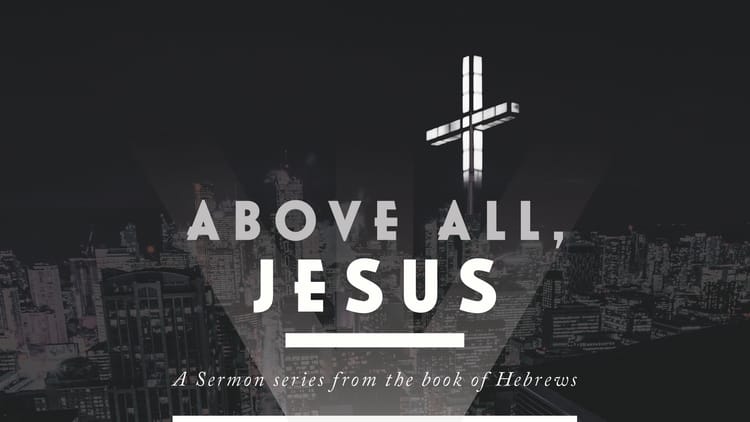Hold Fast (Hebrews 6:13-20)

Big Idea: Cling to Jesus under pressure because you can count on his promises, and he will give you the stability you need.
The year was A.D. 155, and the persecution against Christians swept across the Roman Empire. Finally, it came to Smyrna, an Ancient Greek city located in modern-day Turkey.
The proconsul of Smyrna ordered that the elderly Bishop of Symrna, a man named Polycarp, be found, arrested, and brought to the public arena for execution.
So they found him. They brought him before thousands of spectators screaming for blood. But the proconsul had compassion on this man who was almost a hundred years old. He silenced the crowd. He then gave Polycarp a way to save his life: "Curse the Christ and live,” he said.
The crowd waited for the old man to answer. In an amazingly strong voice, he said, "Eighty and six years have I served him, and he has done me no wrong. How dare I blaspheme the name of my king and Lord!"
They then burned the old man at the stake and pierced with a spear for refusing to burn incense to the Roman emperor. On his farewell, he said: "I bless you, Father, for judging me worthy of this hour, so that in the company of the martyrs I may share the cup of Christ."
The writer of Hebrews has one agenda: to encourage his readers to hang to their faith in Christ when under unrelenting pressure to compromise. The original readers faced this pressure. They had been socially marginalized. Some of them had been imprisoned and lost their property for their faith (10:34). Even worse, more trouble lay ahead (12:4). It was going to get worse, not better. They were getting discouraged and losing heart. Why should they cling to Christ under this kind of pressure?
We, too, face pressure to abandon our faith in Christ. We probably won’t be martyred like Polycarp. We may not even lose our properties. But we will probably be socially marginalized. It’s conceivable that some of us may face jail time for our faith. Some laws are forcing pastors and church leaders to change their message or face the consequences. It is possible that some of us could risk losing our jobs because our dedication to Christ conflicts with the expectations our employer has of us.And it might get worse. One of the urgent jobs that we face in the church these days is to prepare ourselves for what it might cost to follow Jesus in the days to come.
Why should we cling to Christ under this kind of pressure? Because of an example, and because of two compelling reasons.
An Example
Here’s the example:
For when God made a promise to Abraham, since he had no one greater by whom to swear, he swore by himself, saying, “Surely I will bless you and multiply you.” And thus Abraham, having patiently waited, obtained the promise. (6:13-15)
The example is Abraham. Why is Abraham such a good example? Because God made him a promise. In Genesis 22, God had promised him:
I will surely bless you, and I will surely multiply your offspring as the stars of heaven and as the sand that is on the seashore. And your offspring shall possess the gate of his enemies, and in your offspring shall all the nations of the earth be blessed, because you have obeyed my voice. (Genesis 22:17-18)
Here’s the hard part about that promise: Abraham had very little evidence, apart from God’s promise, that any of it was going to come true. On one hand, he had this promise from God. On the other hand, he had his circumstance, and there as not much in his circumstances to give him hope. In fact, his circumstances seemed to contradict God’s promise. Abraham’s whole life had been long and weary, with great doubts and obstacles. And now God gave him an enormous promise that he would never see fulfilled in his lifetime — in fact, that nobody would see come true for centuries.
The promise on one hand, dire circumstances on the other. Which did Abraham choose? Verse 15: “And thus Abraham, having patiently waited, obtained the promise.”
You get his point, don’t you? You see your circumstances on the one hand, and they’re not good. You see God’s promises on the other hand, and they are amazing. Which one do you believe? God’s promises every time.
If you ever have to choose between what you see with your eyes and what God has promised to be true, always go with God’s promise. That’s what he’s saying. You can’t always trust what you see with your eyes, but you can always count on God’s promises.
Sometimes we need to see this lived out. That’s what’s so good about the example the writer gives us. If Abraham could trust God despite all the obstacles, and despite never seeing the promise come true in his lifetime, why wouldn’t we trust God too?
That’s the example the writer gives us. Friends, look at Abraham. He faced difficult circumstances. He sometimes wobbled in his obedience. But he patiently waited, and he obtained the promise. If we wait patiently, he’s saying, we can also count on God’s promises too.
Two Compelling Reasons
But he doesn’t stop there. He gives us two compelling reasons why we can cling to Christ, even when we face unrelenting pressure to compromise.
Reason One: You can always count on God’s promises
Every promise that’s made is only as good as the person who makes the promise. When someone who’s been married eight times stands before a justice of the peace and says, “I do,” you take their promise with a grain of salt because up until now they haven’t. You don’t necessarily accept a promise from an untrustworthy person because a promise is all about the character of the one who made the promise.
But there’s a way around this problem. You can also swear on the basis of something that is greater. That’s why people swear on their mother’s grave, for instance. The assumption is that, even if their word isn’t trustworthy, you can count on that promise because they’re not just swearing based on themselves; they’re swearing on something even greater than themselves.
The author makes this point in verse 16: “For people swear by something greater than themselves, and in all their disputes an oath is final for confirmation.”
If this is true, how did God guarantee his promise? In verse 13, he’s already said that there’s nobody greater than God by whom to swear, so there don’t appear to be many options.
So when God desired to show more convincingly to the heirs of the promise the unchangeable character of his purpose, he guaranteed it with an oath, so that by two unchangeable things, in which it is impossible for God to lie, we who have fled for refuge might have strong encouragement to hold fast to the hope set before us. (6:17-18)
What encourages us to hold on? Two unchangeable things:
- His promise — We’ve already looked at that. You can take God’s promise to the bank because of the One who made that promise. But that’s not all:
- His oath — God not only made a promise to Abraham but he has backed it with an oath. Kent Hughes writes, “His oath, though unnecessary, is the double assurance that he cannot lie. Truth has sworn by itself that its truth shall truly be fulfilled. There is no more possibility of God’s promises failing us than of God falling out of Heaven! His Word is eternally sealed with the double surety of promise and oath.”
In other words, the promises that God made to Abraham — and the promises God made to us — are completely trustworthy.
The money in your bank, up to $100,000, is guaranteed by the Canada Deposit Insurance Corporation. The legal tender in your pocket, if you have any, is backed by the Bank of Canada. The promises God has given you in his word are backed by God himself, and you can’t have a more trustworthy guarantee. He’s never failed to keep any of his promises.
Why should you cling to Christ even when you face unrelenting pressure to compromise? Because you can always count on his promises.
Okay. We have an example of trusting God in the person of Abraham. We also have one compelling reason to cling to Jesus despite unrelenting pressure: because we an always count on his promises. We find one more reason in this passage to cling to Jesus even under pressure:
Reason Two: Because of the security we have in Jesus
Read verses 19-20:
We have this as a sure and steadfast anchor of the soul, a hope that enters into the inner place behind the curtain, where Jesus has gone as a forerunner on our behalf, having become a high priest forever after the order of Melchizedek.
What a great picture for those who were tempted to drift away: we have an anchor. When we’re tempted to drift, when the waves are coming at us, when everything looks unstable, we have a strong and dependable anchor of our soul. It’s not a flimsy anchor. It’s a sure and steadfast anchor. It gives us the stability we need even in the middle of the storm.
And so when life is coming at you trying to push you away, you can know you’re okay. Because you’ve got an anchor. That anchor is a person: Jesus.
The security of our souls rests firmly in the eternal, high-priestly work of Christ, by which he has entered into God’s presence on our behalf and made a way for us to follow. Our stability of soul thus stems from all the power and provisions to be found as we stand before the face of God. (George Guthrie)
We need the warning passage that we talked about last week. We need to be reminded of what’s at stake when we get sluggish in our faith. But we also need the assurance that Jesus is our sure and steadfast anchor, and that we look to him and the promises of God for our hope. He saves sinners; he sustains his people; he is our hope from beginning to end.
What’s the point of all of this? Why do we need this example and these two reasons to cling to Christ under pressure?
Because we’re going to face pressure. We live in a time when it’s hard to be a follower of Jesus Christ. It hasn’t been that way in recent times in North American, but times when it’s relatively easy to follow Jesus are rare. They’re the exception.
We’re entering a time when there will be a cost to following Jesus. We may face social pressure. Some of us may lose our jobs. Some of us may even go to jail. But we’ll at least lose face. And there will be all kinds of pressure on us to not believe in the promises of God.
But Abraham believed, and he patiently waited. He never saw the promise fulfilled in his lifetime, but God kept his promise. Polycarp believed. He lost his life, but he kept something greater: he kept his eyes on the One who never let him down, even in death. He got what he hoped for in Jesus.
Cling to Jesus under pressure because you can count on his promises, and he will give you the stability you need.
We have exactly what we need to hold on to Jesus even when everything is coming at us. We have God’s promises that will never fail, and we have a sure and steadfast anchor of the soul in Jesus. Not only did he die for our sins and rise to give us new life, but he’s got us. He’s giving us all the stability we need.
So, in light of us, verse 18 says, “we who have fled for refuge might have strong encouragement to hold fast to the hope set before us.” Friends, hold fast to the One who is holding you fast. He’ll never let you go, so hold on to the one who’s keeping you safe.





